
Dental implants are synthetic devices that a dental surgeon places into the jawbone. Individuals may need implants if they have experienced the loss of one or more teeth.
Let’s delve into the cost of dental implants in Mexico, the other factors that can affect the cost of the treatment, and how the procedure is done.
An Overview of Dental Implant
Dental implant surgery is a medical procedure designed to replace tooth roots with metal posts resembling screws, as well as to substitute damaged or absent teeth with artificial ones that closely mimic the appearance and functionality of natural teeth. This surgical intervention serves as a valuable alternative to ill-fitting dentures or bridgework and provides a solution in cases where the absence of natural tooth roots precludes the construction of traditional dentures or bridge replacements.
The execution of dental implant surgery varies based on the specific type of implant and the condition of the jawbone. The procedure may encompass multiple stages. A significant advantage of dental implants is the robust support they provide for the new teeth, which necessitates the bone to heal securely around the implant. This healing process can be time-consuming, often extending over several months.
Dental Implant Cost in Mexico
Dental implant cost in Mexico ranges from Mex$ 1,45,000 to Mex$ 4,84,400 (7500 USD to 25000 USD). The cost of the treatment will vary depending on the type of implant one wants. Other additional factors can also affect the cost of dental implant in Mexico.
Factors That Can Affect Dental Implant Cost in Mexico
Below are some of the various factors that can affect the cost of the dental implant cost in Mexico:
- Local Economic Conditions: The expenses associated with metropolitan areas such as Delhi or Mumbai may exceed those in smaller cities.
- Type of Implants: The cost can fluctuate based on the specific type of implant utilized.
- Availability of Specialized Equipment: Certain medical centers may incur higher costs, particularly if they employ advanced technologies like proton therapy.
- Expertise of the Specialist: Some locations may impose elevated fees due to the presence of highly skilled specialists from abroad.
- Hospital/Clinic Infrastructure: Facilities that are equipped with modern technology and infrastructure, which can be costly, may lead to increased operational expenses.
- Volume of Patients: Additionally, pricing may be influenced by patient volume, as centers with a higher number of patients might offer slightly reduced rates.
What are the Types of Dental Implant?
Here are the two types of dental implants used for damages teeth.
- Endosteal Implants (within the bone): The most common type of dental implant is the endosteal implant. It can be designed in various forms, including screws, cylinders, or blades that are surgically placed into the jawbone. Each implant serves to anchor one or more prosthetic teeth. Individuals who currently rely on removable dentures or dental bridges may find this type of implant to be a suitable alternative.
- Subperiosteal Implants (on the bone): This type of implant is positioned on the surface of the mandible and is secured by metal posts that penetrate through the gum tissue. Subperiosteal implants are typically recommended for patients who cannot use conventional prosthetics and do not possess adequate bone height to accommodate an endosteal implant.
Also Read:- Dental Implant cost in India
What are the Types of Dental Implant Procedures?
To create a treatment plan tailored to your specific needs, your periodontist will consider the type of artificial tooth and prosthesis you choose. In India, there are numerous options available for dental implants.
Based on individuals situation, the following treatment alternatives may be suitable:
- Single-tooth dental implant: This option is designed to replace a single missing tooth.
- Multiple-tooth dental implant: This approach allows for the replacement of several lost teeth.
- Full-mouth dental implant: This solution is utilized when all teeth are missing, providing a complete restoration.
- Sinus Augmentation: The success of an implant largely depends on the quantity and quality of the bone at the implant site. The upper back jaw has historically posed challenges for implant placement due to insufficient bone and proximity to the sinus. Sinus augmentation addresses this issue by elevating the sinus floor and generating bone that can support dental implants.
- Ridge Modification: Irregularities in the upper or lower jaw can lead to inadequate bone for implant placement. To rectify this, the gum is retracted from the protrusion to expose the area lacking bone. Subsequently, bone or a bone substitute is used to fill the gap and form a ridge. Ridge modification has been shown to significantly improve the aesthetic appearance of the jaw and increase the likelihood of successful implant placement.
How can Medsurge India Help?
Medsurge India serves as a support network for patients seeking medical professionals, healthcare facilities, and specialized treatments. We are committed to identifying the most appropriate medical solutions tailored to your needs.
Our team will provide you with a curated list of certified, reputable, and trustworthy doctors and hospitals concerning your medical concerns. Furthermore, we develop treatment plans that aligns with your financial considerations. In addition, we assist patients in securing travel authorizations, medical visas, and various other essential services.
Get Free Cost Estimation
The Most Important Frequently Asked Questions
Q1: How Long Does a Dental Implant Last?
A1: The sole permanent solution for tooth replacement is dental implants. This is because the implant serves as a replacement for the dental foundation. With proper maintenance, implants can endure for the entirety of one’s life. However, after a period of 10 to 15 years, the replacement teeth, including crowns or implant-supported prostheses, may require replacement. Overall, dental implants have the potential for a long lifespan.
Q2: What Are the Disadvantages of Dental Implants?
A2: Dental implants may present various potential complications, including infection, damage to adjacent teeth, delayed bone healing, among others.
Q3: Can Dental Implants Be Removed?
A3: Dental implants, while regarded as permanent fixtures, can indeed be removed.
Q4: Does Dental Implant Get Cavities?
A4: The crown restored by an implant is impervious to cavities due to its composition of artificial material, specifically titanium, as opposed to natural substances.
Q5: Do Dental Implants Need Maintenance?
A5: Dental implants represent an excellent choice for tooth replacement, as they are the only solution that is permanent. Unlike artificial teeth such as dentures, which require particular maintenance and cleaning routines, dental implants necessitate regular brushing, flossing, and routine dental examinations.



























